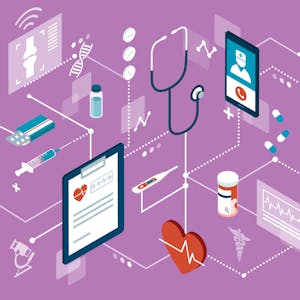Introduction to Clinical Data
This course introduces you to a framework for successful and ethical medical data mining. We will explore the variety of clinical data collected during the delivery of healthcare. You will learn to construct analysis-ready datasets and apply computational procedures to answer clinical questions. We will also explore issues of fairness and bias that may arise when we leverage healthcare data to make decisions about patient care.The Stanford University School of Medicine is accredited by the Accreditation Council for Continuing Medical Education (ACCME) to provide continuing medical education for physicians. Visit the FAQs below for important information regarding 1) Date of original release and Termination or expiration date; 2) Accreditation and Credit Designation statements; 3) Disclosure of financial relationships for every person in control of activity content.
How to apply a framework for medical data mining
Ethical use of data in healthcare decisions
How to make use of data that may be inaccurate in systematic ways
What makes a good research question and how to construct a data mining workflow answer it
Syllabus
Syllabus - What you will learn from this course
Week 1
Asking and answering questions via clinical data mining
Week 2
Data available from Healthcare systems
Week 3
Representing time, and timing of events, for clinical data mining
Week 4
Creating analysis ready datasets from patient timelines
Week 5
Handling unstructured healthcare data: text, images, signals
Week 6
Putting the pieces together: Electronic phenotyping
Week 7
Ethics
Week 8
Course Conclusion
FAQ
When will I have access to the lectures and assignments?
Access to lectures and assignments depends on your type of enrollment. If you take a course in audit mode, you will be able to see most course materials for free. To access graded assignments and to earn a Certificate, you will need to purchase the Certificate experience, during or after your audit. If you don't see the audit option:
What will I get if I subscribe to this Specialization?
When you enroll in the course, you get access to all of the courses in the Specialization, and you earn a certificate when you complete the work. Your electronic Certificate will be added to your Accomplishments page - from there, you can print your Certificate or add it to your LinkedIn profile. If you only want to read and view the course content, you can audit the course for free.
Is financial aid available?
Yes. In select learning programs, you can apply for financial aid or a scholarship if you can’t afford the enrollment fee. If fin aid or scholarship is available for your learning program selection, you’ll find a link to apply on the description page.
Is this activity accredited for Continuing Medical Education (CME)?
Dates and Duration
Original Release Date: 08/10/2020
Expiration Date: 08/10/2023
Estimated Time to Complete: 11 hours
CME
Credits Offered: 11.00
Accreditation
The Stanford University School of Medicine is accredited by the Accreditation Council for Continuing Medical Education (ACCME) to provide continuing medical education for physicians.
The Stanford University School of Medicine designates this enduring material for a maximum of 11.00 AMA PRA Category 1 Credits™. Physicians should claim only the credit commensurate with the extent of their participation in the activity.
Disclosures
The Stanford University School of Medicine adheres to ACCME Criteria, Standards and Policies regarding industry support of continuing medical education. There are no relevant financial relationships with ACCME-defined commercial interests for anyone who was in control of the content of this activity.
Reviews
Excellent overview supported by good frameworks for understanding concepts.
Good introductory course covering key features of the various data that are gathered or used in health care. No prior knowledge about the topic is required.
Very nice and accessible introduction to clinical data and the associated ethical considerations.
Was helpful and informational - a non-healthcare technologist looking into healthcare data management
